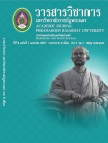การบริหารจัดการทุนมนุษย์ในองค์การด้านโทรคมนาคม: ศึกษาเปรียบเทียบระหว่างวิสาหกิจภาครัฐและธุรกิจภาคเอกชน
Keywords:
ทุนมนุษย์, วิสาหกิจภาครัฐ, องค์การธุรกิจภาคเอกชน, ธุรกิจโทรคมนาคม, Human Capital, Private Organization, Public Organization, Telecommunication BusinessAbstract
วิจัยเรื่องนี้ มีวัตถุประสงค์เพื่อ 1) ศึกษา สัมฤทธิ์ผลของการบริหารจัดการทุนมนุษย์ขององค์การ วิสาหกิจภาครัฐและธุรกิจภาคเอกชนด้านโทรคมนาคม 2) เปรียบเทียบองค์ประกอบของการบริหารจัดการทุน มนุษย์ขององค์การวิสาหกิจภาครัฐและธุรกิจภาคเอกชน ด้านโทรคมนาคม 3) ศึกษาปัจจัยเกี่ยวกับการบริหาร ทุนมนุษย์ของวิสาหกิจภาครัฐและธุรกิจภาคเอกชน ด้านโทรคมนาคม การศึกษานี้ใช้วิธีการศึกษาแบบผสาน วิธี ประกอบด้วยการวิจัยเชิงคุณภาพและการวิจัยเชิง ปริมาณ การวิจัยเชิงคุณภาพดำเนินการโดยสัมภาษณ์ ผู้ให้ข้อมูลสำคัญจำนวน 15 คน ที่เลือกมาแบบเจาะจง จากผู้บริหารและเจ้าหน้าที่ระดับปฏิบัติการขององค์การ ฝ่ายทรัพยากรมนุษย์ โดยใช้การสัมภาษณ์แบบกึ่งมี โครงสร้าง และการจัดการสนทนากลุ่ม จำนวน 2 กลุ่ม โดยผู้ร่วมสนทนากลุ่มละ 10 คน ได้รับการคัดเลือก แบบเจาะจงจากหัวหน้างาน ผู้จัดการ และพนักงาน ระดับปฏิบัติการ ซึ่งประกอบด้วย พนักงานจากฝ่าย การเงินและบัญชี ฝ่ายวิจัย และพัฒนาผลิตภัณฑ์ ฝ่าย ธุรกิจลูกค้าสัมพันธ์ ฝ่ายเทคโนโลยีสารสนเทศ และ วิเคราะห์ข้อมูลด้วยการวิเคราะห์เชิงเนื้อหา ประกอบ ด้วยการแปรความ การตีความและการวิเคราะห์ความ การวิจัยเชิงปริมาณดำเนินการโดยเก็บข้อมูลด้วย แบบสอบถามที่มีระดับความเชื่อมั่นที่ 0.93 จากกลุ่ม ตัวอย่างจำนวน 1,000 คน ที่เลือกแบบบังเอิญจาก ผู้ใช้บริการในเขต 8 จังหวัด ได้แก่ จังหวัดเชียงใหม่ ลำปาง พิษณุโลก ขอนแก่น อุดรธานี สุราษฎร์ธานี ภูเก็ต และกรุงเทพมหานคร วิเคราะห์ข้อมูลด้วยสถิติ พรรณนา ประกอบด้วย ค่าร้อยละ ค่าเฉลี่ย ค่าส่วน เบี่ยงเบนมาตรฐาน
ผลการศึกษาพบว่า 1) สัมฤทธิ์ผลโดยรวม ของการบริหารจัดการทุนมนุษย์ขององค์การวิสาหกิจ ภาครัฐ และธุรกิจภาคเอกชนด้านโทรคมนาคมโดย รวมอยู่ในระดับปานกลาง และเมื่อพิจารณารายด้าน พบว่า ด้านประสบการณ์ในการทำงานของพนักงานทั้ง สององค์การอยู่ในระดับมากสุด รองลงมาได้แก่ ด้าน ทักษะ ความสามารถในการทำงานของพนักงาน ด้าน ความรู้ในงานที่ทำ และด้านความคิดริเริ่ม สร้างสรรค์ การเปรียบเทียบองค์ประกอบของการบริหารจัดการทุนมนุษย์ขององค์การวิสาหกิจภาครัฐและธุรกิจภาค เอกชนด้านโทรคมนาคม ใน 4 ด้านของการบริหาร จัดการทุนมนุษย์ ได้แก่ การสรรหาและคัดเลือก การ ฝึกอบรมและพัฒนาทุนมนุษย์ การบริหารค่าตอบแทน และสวัสดิการ การแรงงานสัมพันธ์ พบว่า (1) ด้านการ สรรหาและคัดเลือก องค์การธุรกิจภาคเอกชนมีความ อ่อนตัวมากกว่าวิสาหกิจภาครัฐ โดยไม่ยึดติดกับกฎ ระเบียบที่เป็นอุปสรรคต่อการสรรหา เหมือนวิสาหกิจ ภาครัฐ เพราะองค์การธุรกิจภาคเอกชนมีอิสระในการ ตัดสินใจดำเนินการ โดยไม่จำเป็นต้องได้รับการอนุมัติ จากหน่วยงานภายนอกแต่อย่างใด (2) ด้านการฝึกอบรม และพัฒนาทุนมนุษย์ ธุรกิจภาคเอกชนมีความยืดหยุ่น ในการจัดสรรงบประมาณในการฝึกอบรมและพัฒนา มากกว่าองค์การวิสาหกิจภาครัฐ เนื่องจากองค์การ ธุรกิจภาคเอกชนมีอิสระในการถ่ายทอดทางเทคโนโลยี จากภายนอกองค์การมากกว่าวิสาหกิจภาครัฐ (3) ด้าน การบริหารค่าจ้างค่าตอบแทนและสวัสดิการ ธุรกิจภาค เอกชนมุ่งเน้นในการจ่ายค่าตอบแทนที่มากกว่าวิสาหกิจ ภาครัฐ แต่องค์การวิสาหกิจภาครัฐจะให้ความสำคัญกับ สวัสดิการมากกว่าค่าตอบแทนที่เป็นตัวเงิน (4) ด้านการ แรงงานสัมพันธ์ ในองค์การวิสาหกิจภาครัฐได้จัดตั้ง สหภาพแรงงานเพื่อเป็นผู้แทนของพนักงานในการเสนอ ความต้องการและความคิดเห็นต่าง ๆ จึงมีอำนาจในการ ต่อรองมากกว่าองค์การภาคเอกชน และ 3) ปัจจัยเกี่ยว กับบริหารจัดการทุนมนุษย์ขององค์การธุรกิจภาคเอกชน จะมีมากกว่าวิสาหกิจภาครัฐใน 2 ปัจจัย คือ การกำหนด วิสัยทัศน์ด้านทุนมนุษย์ที่ชัดเจน และ สิ่งแวดล้อมใน การทำงาน ส่วนปัจจัยในด้านอื่น ๆ อีก 6 ปัจจัยนั้น เหมือนกันทั้งสององค์การ ได้แก่ (1) การสนับสนุน ของผู้บริหารระดับมากขององค์การ (2) การประยุกต์ใช้ เทคโนโลยีสารสนเทศในการบริหารจัดการทุนมนุษย ์ (3) ศักยภาพและทักษะของเจ้าหน้าที่ฝ่ายบริหารทรัพยากร มนุษย์ที่ดูแลรับผิดชอบด้านการบริหารจัดการทุนมนุษย์ (4) วัฒนธรรมขององค์การด้านการบริหารทรัพยากร มนุษย์ (5) นโยบาย โครงการ และกิจกรรมทางการ บริหารจัดการทุนมนุษย์จะต้องสามารถทำให้เกิดความ พึงพอใจ รวมทั้งความต้องการทางด้านเศรษฐกิจและ ด้านอารมณ์ของพนักงาน (6) ความสอดคล้อง สัมพันธ์ กันระหว่างวิสัยทัศน์ ทิศทางการดำเนินงานขององค์การ กับวิสัยทัศน์ทางการบริหารจัดการทุนมนุษย์
ผลกระทบจากการเปลี่ยนแปลงทางด้าน เทคโนโลยีทางการสื่อสารที่เป็นไปอย่างรวดเร็ว ส่ง ผลให้การแข่งขันของโลกธุรกิจทวีความรุนแรงมากขึ้น ตลอดเวลา เพื่อให้องค์การสามารถอยู่รอดได้ องค์การ วิสาหกิจภาครัฐจำเป็นต้องเปลี่ยนแปลงแนวทางการ บริหารทุนมนุษย์ให้มีความสอดคล้อง และมีความ ยืดหยุ่นเพื่อให้ปรับตัวได้ทันต่อการเปลี่ยนแปลงที่ เกิดขึ้น เนื่องจากทุนมนุษย์เป็นปัจจัยสำคัญที่จะผลัก ดันให้องค์การประสบผลสำเร็จได้ ดังนั้น ความจำเป็น ในการสร้างทุนมนุษย์ที่มีประสิทธิภาพด้วยการสร้าง คุณสมบัติของทุนมนุษย์ที่แตกต่าง มีคุณค่า และมี ลักษณะเฉพาะ หรือที่เรียกว่าทุนองค์การซึ่งเป็นการ สร้างคุณลักษณะขององค์การที่องค์การอื่นไม่สามารถ ลอกเลียนแบบได้ ความสำคัญของการสร้างความแตก ต่างนี้เป็นการสร้างความเป็นเอกลักษณ์เฉพาะตัวของ องค์การนั่นเอง
Human Capital Management in Telecommunication Business: A Comparative Study between Public and Private Organizations
The objectives of this research were to 1) to study the effectiveness of human capital management of public and private organizations in telecommunication business, 2) to compare the components of human capital management of public and private organizations in telecommunication business and 3) to study the factors involving human capital management of public and private organizations in telecommunication business. This study was a mixed methods research which combined both the qualitative and quantitative approaches. The qualitative research was conducted by in-depth interviewing 15 key informants who were purposively selected from managers and operational personnel of Human Resources division, and the focus group which was divided into 2 groups with 10 participants per each. The participants of focus group were purposively selected from staffs in managers and operational personnel levels in various divisions of Finance & Accounting, Research and Product Development, Customer Relations, and Information Technology departments. The data were analyzed by using content analysis which consists of translation, interpretation and analysis. The quantitative research was conducted by studying the sample of 1,000 respondents, who were selected accidentally from the users in 8 provinces, consisted of Chiang Mai, Lampang, Phitsanulok, Khonkaen, Udornthani, Surat Thani, Phuket and Bangkok Metropolitan. The sample size was obtained by the calculation with Taro Yamane formula. The data were collected by using the questionnaires with the level of confidence 0.93 and the statistics used for data analysis composed of percentage, means and standard deviations.
The research results were as follows: 1) the achievement of human capital management of the public and private organizations in telecommunication business in overall was at the moderate level, and once considered in each aspect it revealed that the aspect of working experience of both organizations were at the highest means, followed by the skill of employee aspects, the aspect of knowledge in working and creative initiative aspect, 2) the comparative component of human capital management of public and private organizations in 4 aspects comprising the recruitment and selection, training and development, compensation and benefits, and labor relations were found that (1) the recruitment and selection aspect of private organization was more flexible than the public organization for having less rule and regulations because the private organization had more freedom and independence to make its own decision without getting any permissions from the higher organization, (2) the training and development aspect: the private organization was more flexible than public organization which brought about having more budget for training and development as well as having better technology transferring from external sector, (3) compensation and benefit aspect: the private organization paid higher salary rate than public organization and also focused mostly on monetary package whereas the public organization normally focused on welfare which was non-monetary benefit: (4) labor relations aspect: in the public organization could be able to establish their own labor union to perform as employees representative to voice the demands and opinions which brought about having more bargaining power than in the private organization and 3) the factors involving human capital management of private organization were more than private visualization in human capital aspect and working environment aspect, while having the same other six aspects comprising (1) the support from top management, (2) information technology application in human capital management, (3) the competency and skill of personnel in responsible for human capital management, (4) the organization culture in human capital management, (5) the policies, projects and activities for human capital management should be able to provide perfect satisfaction to all employees in economic and emotional performance and (6) the alignment of organizational vision and working direction should be coped with its own human capital management.
The impact of telecommunication technology changes were happened rapidly and it also led to the global business competition intensified over time. To be able to survive, the public organization must change the approach of human capital management to a consistent pace with the changes and be more flexible in order to timely adjust with the changes. Due to the human capital is the important factor driving for the organization success, therefore the necessity of building the effectiveness of human capital by designing the diversified human capital qualification which was valuable and have unique characteristic that has been known as organization capital. It as an approach to build a unique organization which other organizations cannot be duplicated. And the key major of differentiation was the establishment of the organization identity.
Downloads
How to Cite
Issue
Section
License
"บทความวิชาการในวารสารฉบับนี้ ถือเป็นความรับผิดชอบของผู้เขียนเท่านั้น"
สงวนลิขสิทธิ์ตามพระราชบัญญัติลิขสิทธิ์




